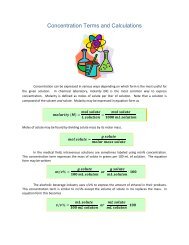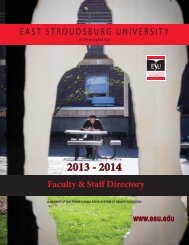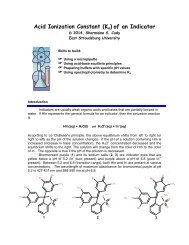Orgon's Obsession in Moliere's Tartuffe
Orgon's Obsession in Moliere's Tartuffe
Orgon's Obsession in Moliere's Tartuffe
You also want an ePaper? Increase the reach of your titles
YUMPU automatically turns print PDFs into web optimized ePapers that Google loves.
18<br />
Viewpo<strong>in</strong>ts Fall 2010<br />
In contrast to Cleante, Madame Pernelle, Orgon’s mother, represents irrationality with<br />
an unforgiv<strong>in</strong>g and judgmental attitude disguised as religious morality. In the open<strong>in</strong>g scene of<br />
the play, she leaves Orgon’s home because she does not approve of the household members’<br />
negative view of <strong>Tartuffe</strong>. Madame Pernelle asserts angrily, “And [<strong>Tartuffe</strong>] practices precisely<br />
what he preaches. He’s a f<strong>in</strong>e man, and should be listened to. I will not hear him mocked by<br />
fools like you” (10). She also criticizes everyone for their “promiscuous enterta<strong>in</strong><strong>in</strong>g” which she<br />
views as immoral although the audience understands that this is just normal socialization. Even<br />
towards the end of the play when Orgon tells her that <strong>Tartuffe</strong> has tried to seduce his wife,<br />
Madame Pernelle does not believe him and still <strong>in</strong>sists that <strong>Tartuffe</strong> is a good religious man. As<br />
is this case with Orgon, the f<strong>in</strong>al antidote to unreason is not reason itself but see<strong>in</strong>g the truth<br />
first-hand. It is only when <strong>Tartuffe</strong> has taken Orgon’s property and tries to have him arrested<br />
that Madame Pernelle f<strong>in</strong>ally comprehends the despicable character that <strong>Tartuffe</strong> really is.<br />
Although Madame Pernelle is not proactively evil, she enables <strong>Tartuffe</strong> to successfully deceive<br />
her son.<br />
Two other victims of <strong>Tartuffe</strong>’s hypocritical actions <strong>in</strong>clude Mariane and Valere, lovers<br />
who struggle with their relationship due to Orgon’s deception and his break<strong>in</strong>g off of their<br />
marriage. At one po<strong>in</strong>t, Mariane is so horrified by the idea of hav<strong>in</strong>g to marry <strong>Tartuffe</strong> that she<br />
tells Dor<strong>in</strong>e, “I’ll kill myself, if I’m forced to wed that man” (54). Near the end of the play, Valere<br />
courageously does everyth<strong>in</strong>g <strong>in</strong> his power to save Orgon from be<strong>in</strong>g arrested by br<strong>in</strong>g<strong>in</strong>g him a<br />
carriage and money with which to escape. Although Orgon is eventually cleared of the charges<br />
and does not need Valere’s help, he is extremely grateful and makes the announcement that he<br />
will arrange Valere’s marriage to Mariane. Here we can see that Valere’s true friendship and<br />
loyalty are contrasted with the false friendship of <strong>Tartuffe</strong>. Furthermore, Valere’s authentic and<br />
admirable love for Mariane contrasts with <strong>Tartuffe</strong>’s lust for Elmire, which leads to his ultimate<br />
downfall.<br />
A number of critics have discussed the unusual role of the K<strong>in</strong>g <strong>in</strong> the play as a center of<br />
correct authority with<strong>in</strong> the larger treatment of reason and irrationality. For <strong>in</strong>stance, <strong>in</strong> his<br />
1955 article “Moliere and the Historian of French Society,” Leon Bernard states,<br />
The heroes of tragedy, Moliere said, could be drawn accord<strong>in</strong>g to the fancy of the<br />
playwright, but the writer of comedy must be close to life. ‘The purpose of comedy,’<br />
he has one of his characters say, ‘is to represent all the defects of men and<br />
particularly those of the present age.’ No class, no profession was spared <strong>in</strong> Moliere’s<br />
plays; only the person of the K<strong>in</strong>g was sacrosanct (Bernard 530).<br />
The character of the K<strong>in</strong>g is vital to the resolution of this play, although he is not a speak<strong>in</strong>g<br />
character or a visible presence on stage. Just when Orgon is about to be arrested, a gentleman








